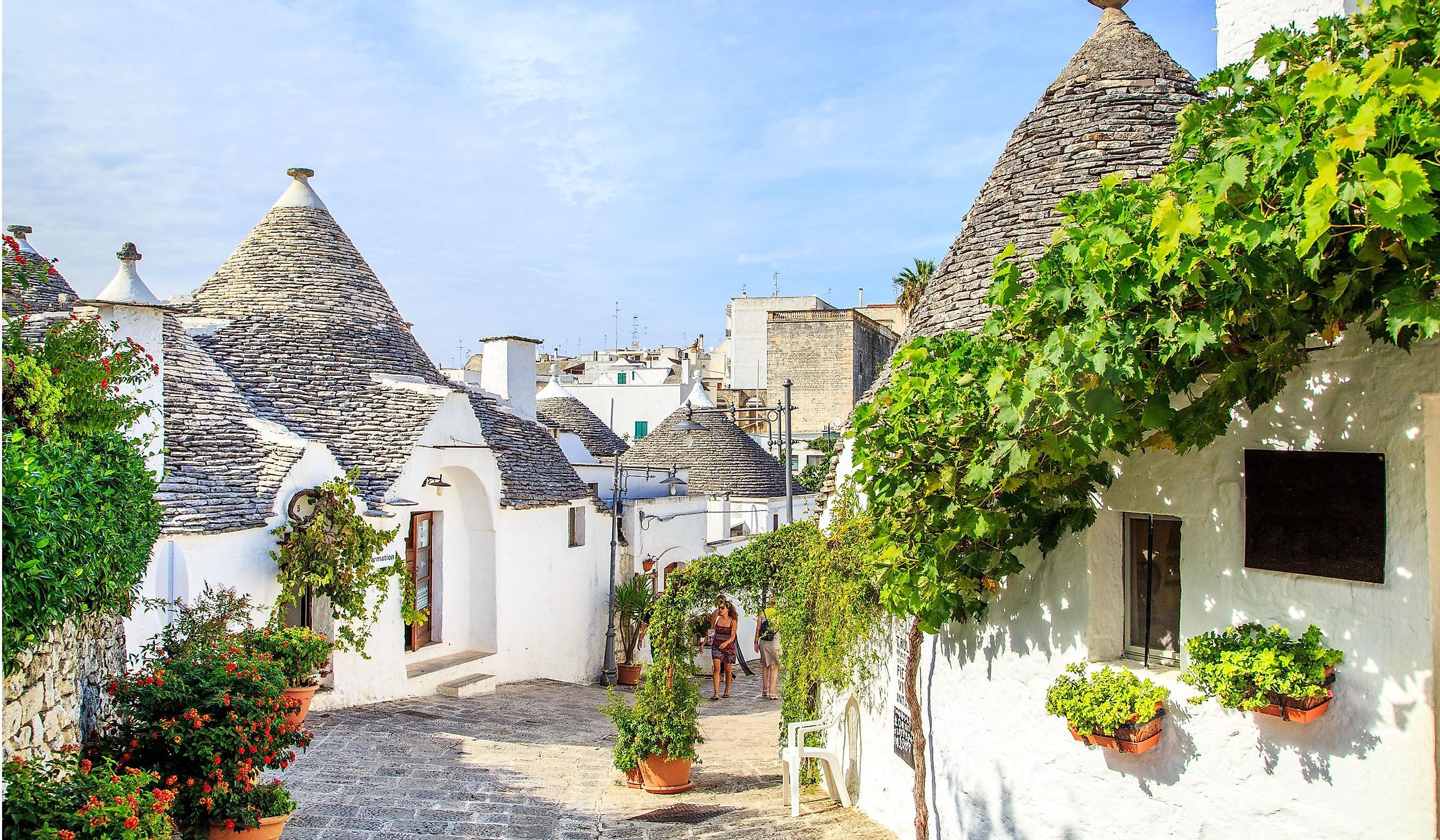
9 Most Welcoming Small Towns in Italy
Rome, Florence, Venice, Pisa—these are places where throngs of tourists gather when they explore Italy. Almost everybody in the world is familiar with these names in association with Italy, and many tourists flock to these famous cities for the historical artistry, and the evolving Italian culture that shaped Europe and beyond for centuries. Yet these major cities are just the start of the wonders that the boot-shaped peninsula of Italy holds.
The most welcoming small towns in Italy will entreat you with surprising historical factoids, natural and cultural attractions, and enough Italian charm to spice up your life. So finish up your spaghetti, gulp down your pizza, and embark like Marco Polo on an adventure through these Italian hometowns.
Portofino

Like sea-worn Aeneas landing on a plot of land that would one day become Rome, steer your vessel to the fishing village of Portofino. Only about 21 miles from Genoa, the pastel-colored houses and cornucopia of seafood restaurants on the Italian Riviera resemble the town from the Pixar movie Luca. Superyachts, smaller yachts, and fishing boats line the Piazzetta, the comune’s small cobbled square overlooking the harbor, offering tourists the opportunity to explore the Ligurian Sea.
The Piazzetta also leads to medieval architectural landmarks like the Church of St. Martin and Castello Brown, a 16th-century fortress that also functions as a museum with art exhibits showcasing Portofino’s past. You might be interested in seeing the Faro di Portofino (Lighthouse of Portofino) and the Church of San Giorgio. If you would rather venture out into the water, then consider cove diving and snorkeling at Baia Cannone or Paraggi Bay. When it comes to accommodations, the Hotel Piccolo Portofino, Eight Hotel Portofino, or Albergo Nazionale will provide impeccable services to you.
Alberobello
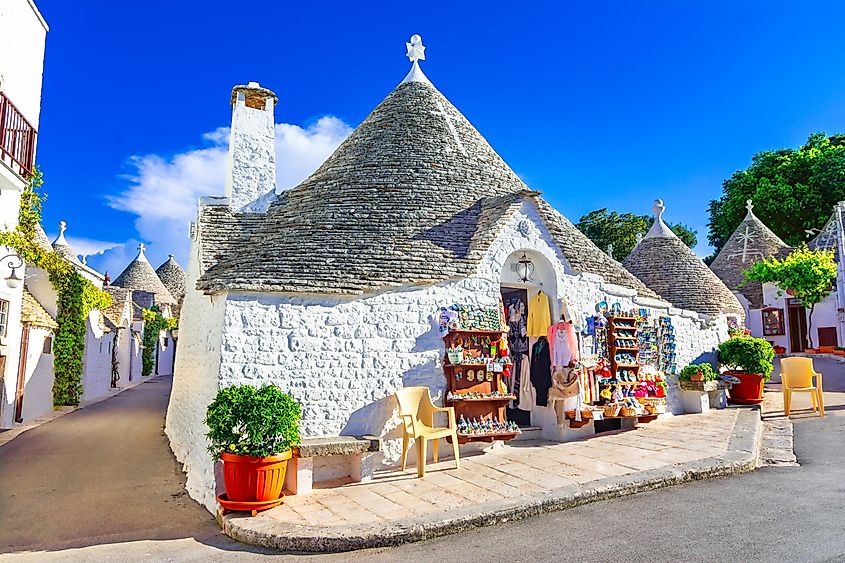
Approximately an hour away from the port city of Bari, the small town of Alberobello in Italy’s Apulia region is a site of strange uniqueness. The first and defining feature that travelers will notice is the Trulli—whitewashed stone huts with conical roofs that resemble the white hats of giant, underground gnomes. The oldest trullo dates back to the 14th and 15th centuries, built by the shrewd Count of Conversano to ensure that his peasants did not live in permanent residences since he would not have to pay bigger taxes for the land.
One can find an entire settlement of these UNESCO World Heritage landmarks at the Aia Piccola and Rione Monti—the latter having over a thousand trulli. There is even a trullo church, the Chiesa di St. Antonio. To learn more about Alberobello’s quirky past, visit the Museo del Territorio Casa Pezzolla for recreations of peasants dwelling in the trulli. Otherwise, book a room at the Grand Hotel La Chiusa di Chietri.
Castelmezzano
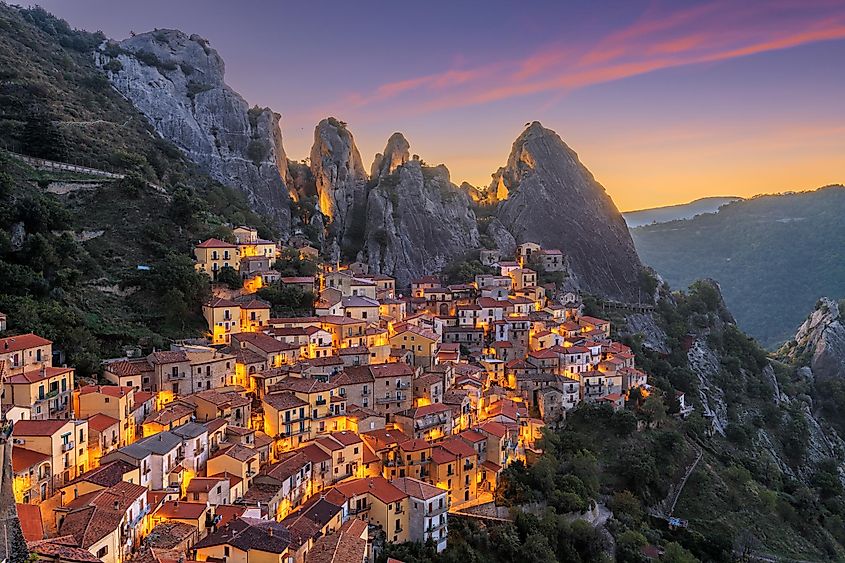
A close neighbor to the comune of Pietrapertosa, the town of Castelmezzano is backgrounded by the jagged Lucanian Dolomites. Thrill seekers can brave the Volo dell'Angelo (Flight of the Angel), a zip line connecting Castelmezzano to Pietrapertosa that offers a soaring experience through the Gallipoli Cognato Piccole Dolomiti Lucane Regional Natural Park. History buffs can traverse the Path of the Seven Stones, a "literary" trek along an ancient peasant path that educates travelers on the town’s history.
The night is the best time to see the town, for the incandescent glows and orange-yellow auras of the houses thrust you back to Castelmezzano’s medieval days. The 13th-century church of Santa Maria dell’Olmo is an especially nostalgic landmark of medieval Italy. Consider seeing Castelmezzano in all its glory at the Hotel Dolomiti, Al Castello, or Monserrat.
Pietrapertosa
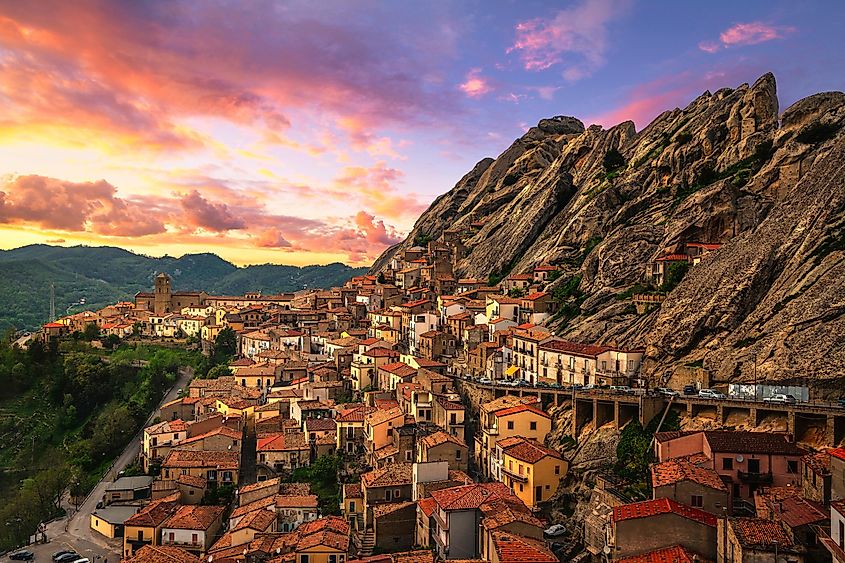
Although sharing many natural attractions with its 25-minute-away neighbor, Castelmezzano, the tiny comune of Pietrapertosa has its own unique Italian treasures. Remnants of the town’s Saracen history can be admired at the l'Arabata quarter, particularly from the ruins of a bell tower, an ancient fortress, and Norman Castle carved into the rock. Visitors can still enjoy a stunning ride on the Volo dell'Angelo heading towards Castelmezzano and also a natural adventure through the Gallipoli Cognato Piccole Dolomiti Lucane Regional Natural Park. Come visit the other side of the Lucanian Dolomites and spend your evenings at the B&B L'Arenaria or Eureka Room & Breakfast.
Cortina d’Ampezzo
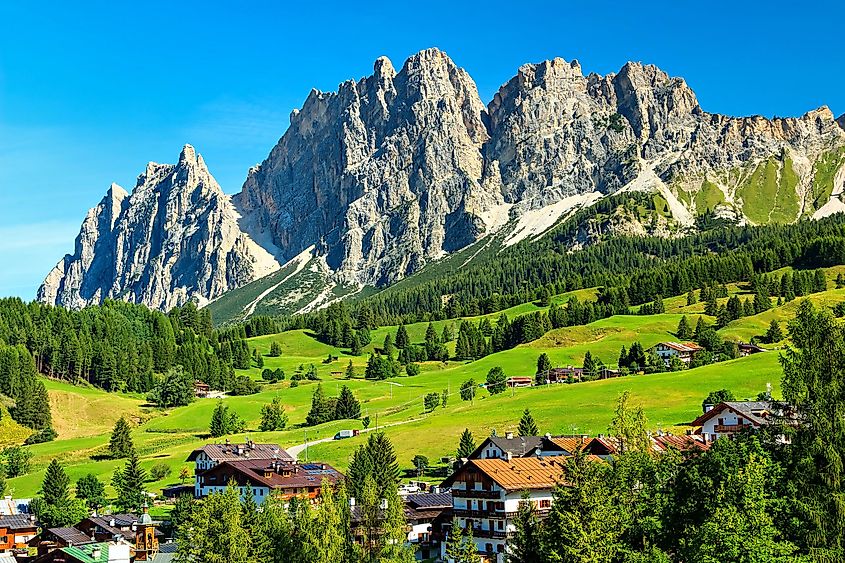
The chill town of Cortina d’Ampezzo, just two hours away from Venice, is a magnificent ski resort in the Italian Alps. Known as the Queen of the Dolomites, the town is situated in the Dolomiti Superski area, which includes the exhilarating downhill runs of Falzarego Pass, access to the wide Ampezzo Valley, and treks and trails leading to the many UNESCO World Heritage peaks of the Dolomites. Memorials of the famous Olympic Games of 1956 can be admired at the Ice Stadium, the Eugenio Monti bobsleigh run, and the disused ski jump Trampoline Olimpico Italia.
Aside from thrilling tourism, visitors can be entreated to scenic remnants of World War 1 at the Open-Air Museum of the Great War, a collection of preserved sites that include the war tunnels at the Lagazuoi, the trenches of the 5 Torri, and a restored fort at Valparola. Cortina d’Ampezzo is no stranger to providing impeccable services to travelers from all over the world, so let the Hotel Cristallino d'Ampezzo, Hotel da Beppe Sello, or Hotel Villa Alpina be among the many lodgings to tuck you warm and cozy in the vibrant Italian Alps.
Bosa
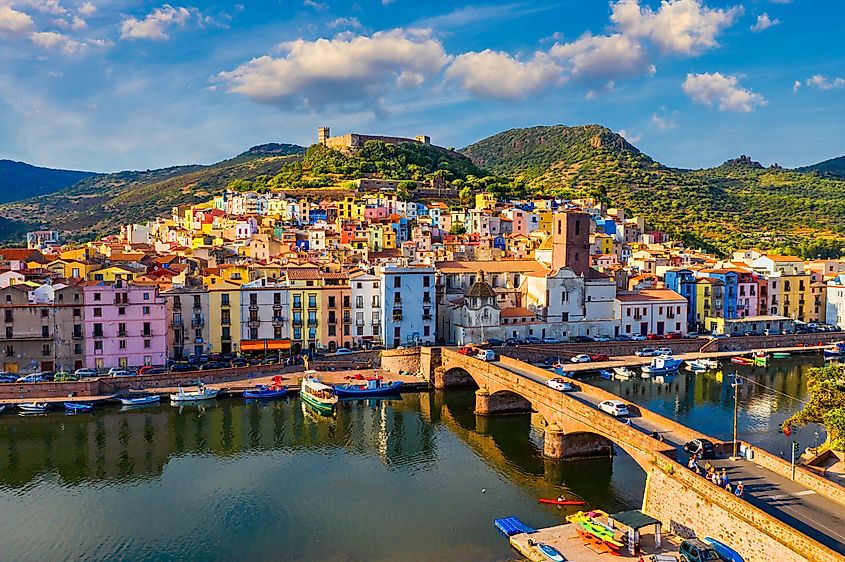
On the island of Sardinia, the beautiful town of Bosa offers a perfect getaway from the busy and bustling delirium of Italy’s mainland. With its location on the banks of the River Temo, Bosa was once a vital center for the local royalty, as best seen in the Malaspina Castle perched atop Serravalle Hill. Furthermore, the ruins of ancient tanneries dominate the area, where fine leathers were made and exported all over Europe.
The Cattedrale dell' Immacolata is an oft-explored Romanesque architecture that embodies the spiritual essence of Bosa. One can gaze out at the history-filled waters of the Mediterranean at the Bosa Marina Beach, or you can scale up the Montiferru mountain ranges to view most of Sardinia. Remember to book a room at the Mannu Hotel, La Vecchia Torre, or Hotel Palazzo Sa Pischedda.
Civita di Bagnoregio
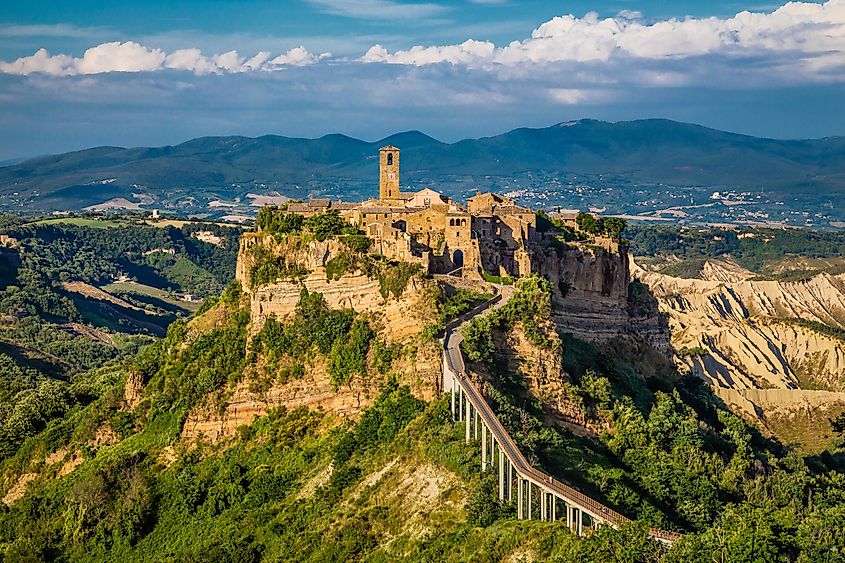
Civita di Bagnoregio is a Lost World immortalizing Middle Age antiquity in the Italian hills. Referred to as “The Dying City” due to its stark isolation from its sister town, Bagneregio, the main entrance to this secluded comune is a huge stone passageway cut by the Etruscans 2,500 years ago and decorated with a Romanesque arch from the 12th century.
Civita di Bagnoregio has no official museum and no guidelines or list of attractions to hidden landmarks that highlight the town’s significance. But it has been known that the town was the site of numerous contentions, falling under the dominions of the Roman Empire, the Goths, the Lombards, and lastly, Charlemagne and the succeeding feudal lords and Papacy. Furthermore, Civita di Bagnoregio was the birthplace of Saint Bonaventure, whose follower was Saint Francis of Assisi. Although straddling the fine line between a ghost town and a vibrant one, there are still a few establishments for visitors to stay at, such as the Palazzo Contino, Court of Majesty – Ancient Residence, and Case di Civita.
Staiti
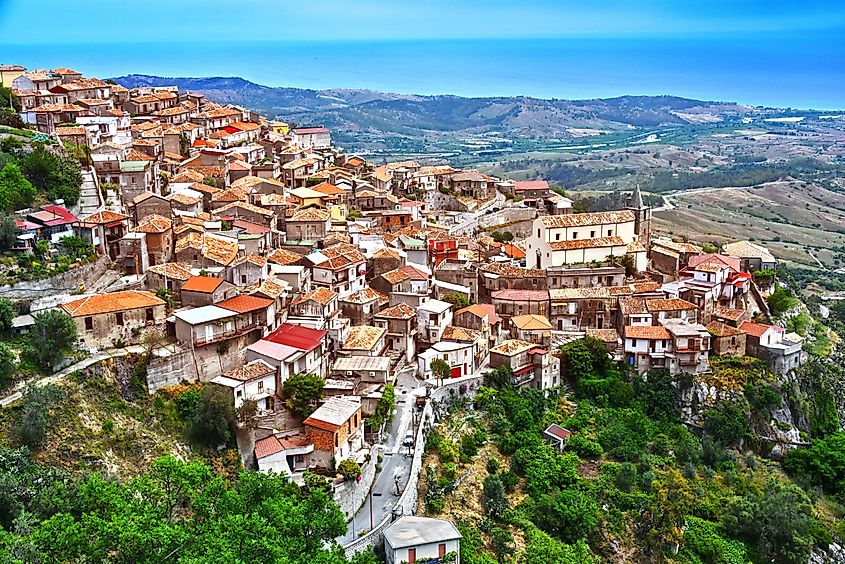
Located at the veritable toes of Italy, the small Byzantine town of Staiti enlivens the beauty of the mountains in the Calabria region. Perched on the side of Rocca Giambatore, a hill overlooking the Bruzzano stream, the comune offers travelers access to the vast Aspromonte National Park. The Museum of Italian-Greek Saints of Staiti educates tourists about the Greek Orthodox traditions of Staiti, while the Sentiero delle Chiese Bizantine exhibits bas-reliefs that recall the important sites and events of Byzantine history in the whole of Calabria.
Three magnificent churches adorn the town—the Chiesa di Sant’Anna, the Santa Maria della Vittoria, and the Santa Maria dei Tridetti. The last one is submerged in deep history dating back to the Locrian people, who dedicated the original temple to the Greek sea god, Poseidon.
Roccascalegna
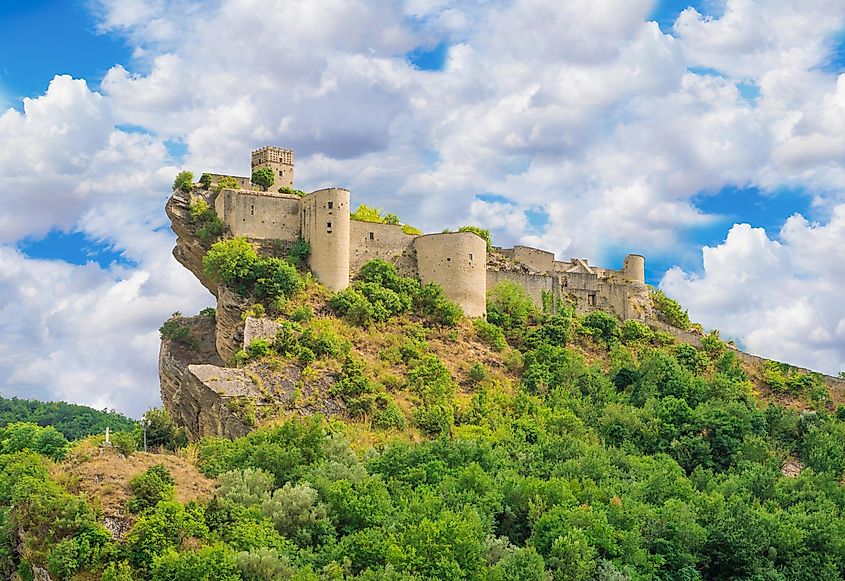
In the ferocious region of the Abruzzo, there is a castle in the sky—or, at most, a medieval fortification perched precariously on a hill overlooking an expansive valley. Roughly three hours away from Rome, the comune of Roccascalegna is situated below the iconic Castello Medioevale di Roccascalegna (Medieval Castle of Roccascalegna). The jutting fortress rises over a hundred meters on limestone formations and was a strategic military fort that the Lombards used to repel the Byzantine Empire.
Roccascalegna’s architectural format captures the beauty and artistry of the Aragon period. Roughly an hour away is the Parco Nazionale della Maiella and the Majella National Park, which teem with Italian biodiversity. For a place to stay, look to B&B del Castello for accommodations.
Italy has kickstarted many of Europe’s developments. From the Roman Empire and the Renaissance to the dominion of the Catholic Church, Italy has continued to become a cultural impetus in the world. But when you look past the papacy and the art, you see the inspirations for these societal powers—the serene small towns where the simple folk have worked the land and nurtured many of the greatest Renaissance artists. If the sheer tourist traffic and mass populations of Rome, Florence, Venice, Pisa, and the rest overwhelm you, then head to the most welcoming small towns of Italy where the true Italian charm can be admired. Either stay home or say ciao to Rome and let Italy’s small towns sing their aves to you.











